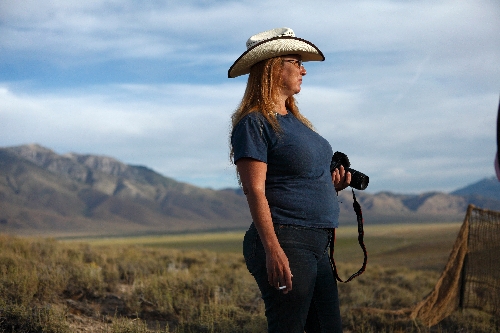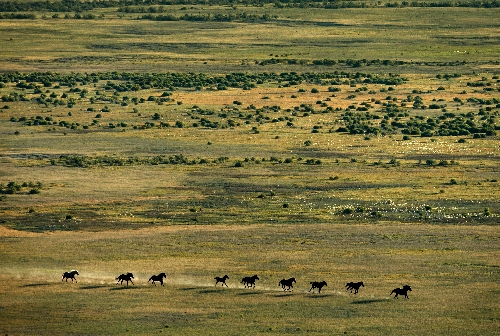Wild Horses: Advocate fights BLM, roundups
RUBY VALLEY --
Laura Leigh's 1998 Ford Explorer is coated in a fine alkaline dust. Sometimes caustic, it makes eyes water and noses bleed when kicked up while driving endless miles of bumpy, unpaved desert road.
Scrawled in the dust of one window is "NO MORE RHETORIC!" -- the war cry of a woman who's been working out of her truck for the past two years to monitor the Bureau of Land Management's wild horse roundups.
An artist, animator and journalist by trade, Leigh posts videos, photos and blogs on the Internet to expose what she sees as abuse. She's filed lawsuits against the BLM on a regular basis, trying to halt roundups when there are too many deaths or instances of alleged inhumane treatment, from helicopters getting too close and driving horses too far to foals being euthanized because of injuries or deformities.
She's claimed a First Amendment violation, accusing BLM officials of not giving her access to a roundup, which the press and the public are permitted to see from designated watch sites.
"What is this agency doing that they don't want the public to know?" Leigh asks. "It's all about this big hide-and-seek game."
And she's documented instances of wild horses being shot, mustangs run literally into the ground, broken legs, aborted foals and horses dying of dehydration after a hot summer roundup.
BLM officials insist that most roundups, which they call "gathers," go off with few hitches and that the death rate is close to 1 percent.
"Some will really fight the helicopter and fight and fight," says Ben Noyes, a wild horse and burro specialist for the Ely BLM district. "Once they're in the catch pens, they tend to calm down pretty fast."
Leigh supports herself from donations to the nonprofit Wild Horse Education group she founded and with work for other organizations.
"I've sold everything I own," says Leigh, who has two grown sons and lived in Washington state before Nevada. "I just patch it together."
During last August's Triple B roundup--named for the area's Buck, Butte and Bald mountains--she traded two cartons of the American Spirit cigarettes she smokes to pay for part of a Motel 6 stay.
She bought her Ford Explorer at auction for $3,000 and put 70,000 miles on it in one year. Duct tape holds the truck's back lift-window in place, the result of hitting the ground hard after a big bump sent the vehicle airborne. She lost a sway bar and a tire went flat.
The Precision Auto mechanic in Ely fixed it for free.
"You the girl watching out for the horses?" Leigh recalls him telling her. "Well, you get back out there and pay when you can."
SLAUGHTERHOUSES AND DEATH THREATS
Like most activists, Leigh has a horror story to tell about what made her give up regular life to devote herself to saving mustangs.
After the BLM won authority to sell excess wild horses in 2004, hundreds of mustangs went to U.S. slaughterhouses -- something the agency later halted and set rules to prevent from happening again. So great was the public outrage, the last of the nation's slaughterhouses closed in 2007 and Congress cut money for government inspections.
One slaughterhouse was in Florence, Wash. Leigh tracked a horse trailer to a feed lot and tried to save two animals. The hauler would only sell her one because his load had to "make weight" so he could earn a profit.
Leigh had to choose, and paid 82 cents a pound for a Percheron, a one-ton draft horse originally bred in France, where they are used for meat.
"She bit me every day for six months," Leigh says of the horse, fighting back tears while remembering the animal she left behind. "I couldn't save him. There's no sanity. There is a history of prejudice that's really entrenched. It's time to evolve."
On site at roundups, Leigh is a constant thorn in BLM's side, although she knows the program handlers so well they treat her like an annoying relative who never seems to stop complaining.
Around a Christmas roundup last year, Chris Hanefeld, BLM spokesman in Ely, gave presents to Leigh and her 140-pound dog, Elvis. They had endured temperatures of 12 degrees below zero together.
"I've spent more time alone with you than any other man," Leigh told Hanefeld, laughing as the two reminisced about past gathers.
"I love you, too," Hanefeld said with a smile.
Still, Leigh couldn't help herself: "But that pilot is still getting too close."
This odd couple also has something darker in common: Both have received death threats because of their work, which excites outsize emotion on both sides.
"You get 'em, too?" Hanefeld asked Leigh, shaking his head. "People feel very passionate about this issue."
Hanefeld and Leigh were on site most days during a July 20-Aug. 31 roundup in eastern Nevada where the BLM planned to gather 1,726 wild horses in Elko and White Pine counties. The agency said the land could support only 472 to 889 horses and estimated the population at 2,198.
In the end, BLM gathered 1,269 wild horses, falling far short of the goal. Activists contend that's a sign the agency inflates the number of mustangs on the range, a charge it routinely dismisses.
The Triple B gather included 12 recorded deaths, including two foals injured in the roundups. One foal was kicked by another horse and the other, a 4-month-old, tried repeatedly to jump a fence to follow an escaping stud and was badly hurt. The BLM put down both foals.
The third gather-related death involved a mare that may have died overnight from fright. The BLM cited "a heart issue" as the cause.
The BLM euthanized nine other horses gathered, including five foals, citing deformities, injuries, pneumonia and blindness in one filly.
"The poor little babies," Leigh says, contending some foals grow out of what appear to be foot deformities. "These foals should not be rounded up, especially in this heat and in foaling season. They can't keep up. There's a real fear that babies are being left out there."
Noyes says peak foaling season is April and May so the BLM usually schedules its gathers from July through February.
"At all costs, we don't want to leave the foals out," he says, noting the BLM tries to keep mares with their foals once in captivity.
ISOLATED CASES OF INHUMANE TREATMENT
Among the most difficult roundup sites during the Triple B gather was outside the Ruby Lake National Wildlife Refuge, 85 miles southeast of Elko and the nation's most isolated stopover for migratory birds.
Dozens of wild horses from the nearby Maverick-Medicine Herd Management area were coming down to drink from the marshes and shallow ponds that support hundreds of species of migratory birds and other wildlife. Thirsty and hungry mustangs don't respect boundaries and can't read a map to know where the BLM says they should stay.
BLM contract wranglers set the trap in a valley between two hills, which hid the brown jute cloth stretched more than 200 feet to funnel the horses into steel corrals.
The contractor, Sun J Livestock Inc., of Vernal, Utah, and its hired helicopter planned to chase the horses from one to 10 miles down from the mountains and around the hill into the trap. But many mustangs headed for higher ground instead to hide in the shade of pinyon and juniper trees as the hot midday approached.
About half the horses the helicopter tried to steer toward the trap broke up into smaller bands of two, three and four mustangs, escaping by running past the trap or even through the soft jute to freedom.
"The horse doesn't want to be separate from other horses," Leigh observed. "All he wants is to run back to all the other horses."
That's what happened with one mustang that nearly got away at
6:50 a.m. on Aug. 11. It was the close helicopter chase that Leigh videotaped and used to ground the aircraft at the end of the roundup.
The horse dodged the jute and scampered up the hill above the trap. When the helicopter got near enough to bump the mustang, Leigh knew she had yet another YouTube moment to use against the BLM.
"There's no reason for this pilot to push this horse up this hill," Leigh said in audio she recorded over the three-minute video. "Please excuse my frustration, but I've spent days and days out here. I'm watching teeny tiny babies run. I'm watching bands fractured. Every band that hits this trap does not come in intact.
"How many babies are being left out there?"
The BLM conducted an internal review of the helicopter incident and Triple B roundup, releasing its findings Dec. 7. The BLM and animal welfare experts agreed there were isolated instances of inhumane treatment, including dragging a horse into a trailer by its roped neck, hitting and kicking horses in the face, and using electric prods, but said overall the roundup went well.
The 11-page report recommended new guidelines to protect horses during gathers, including prohibiting helicopters from bumping animals and avoiding long pursuits of lone mustangs.
"The old ways might have been OK at the time, but they aren't now," BLM spokesman Tom Gorey said. "We're trying to be more open to change rather than circling the wagons."
Days after the review was released, Leigh says she remains skeptical that the BLM will institute real reforms on the ground. And she hopes the federal judge handling her lawsuit challenging the Triple B roundup will hold the BLM to high humane standards, forcing contractors to handle mustangs with more care.
"I do believe a lot of the BLM people on the ground want higher care standards and they just need the teeth to do their jobs," she says. "The Act itself says the BLM wild horse and burro specialists are the first line of defense, and this is the first time BLM is talking about humane care. They've had 40 years to create humane care standards. And these are the only animals that have an act of Congress devoted to their protection."
ADOPTION AFTER ROUNDUPS
After the captured mustangs settle, they're separated by gender and age. The studs go in one pen, wet mares with their foals in another, lone foals and dry mares in two other pens. By day's end, they're taken by trailer to temporary holding corrals. Later, they're transported to short-term holding facilities in Nevada and elsewhere.
In captivity, the mustangs are vaccinated, freeze-branded and readied for adoption at $125 per animal. If they're not adopted, they're shipped to long-term pastures in the Midwest, mostly in Oklahoma and Kansas, to live out their lives, possibly into their 30s. The studs are gelded and live separately from mares to prevent reproduction.
Their lives as wild horses have ended, although under current enforcement of the 1971 federal act they are protected until they die from old age.
Leigh objects to the quick pace of today's roundups, which are steadily sending more wild horses to holding by the thousands. BLM has announced plans to ease up a bit, gathering 7,600 wild horses a year through 2014 instead of the initially planned 10,000 annually.
"They come in like they're cleaning up broken glass," Leigh says. "There's no thought given to what is being removed from this range. This program is upside down so badly because it's running full steam ahead for the special interests on this land."
Some roundups are easier than others. On a tough day, the helicopter and wranglers might capture only a few wild horses. On good days, when the trap is set just right, the total can easily top 100.
On Aug. 14, three days after the troubled roundup, the trap was moved to a site near Cherry Creek, about 60 miles north of Ely and near the route of the historic Pony Express Trail.
A valley between two hills perfectly hid the jute wings and on run after run the helicopter successfully pushed mustang bands into the trap.
The captured wild horses seemed to be running hard and far, coming in covered with a sheen of sweat, reflected by the rising sun.
Yet the mustangs' pace appeared snail-like compared to a herd of 15 pronghorn antelope, which ran from the helicopter, leaving four wild horses trailing in the dust. One of the fastest land animals, pronghorn can reach speeds of 60 miles an hour, nearly double most mustangs.
By the time the helicopter pushed the four wild horses into the trap, a perfect catch, the pronghorns had disappeared in the distance.
"You finally had a clean run," Leigh says, coming as close to a complement as she could. "It's nice to see things different today."
WILD HORSES
Unbridled Passions, Untamed Costs
























